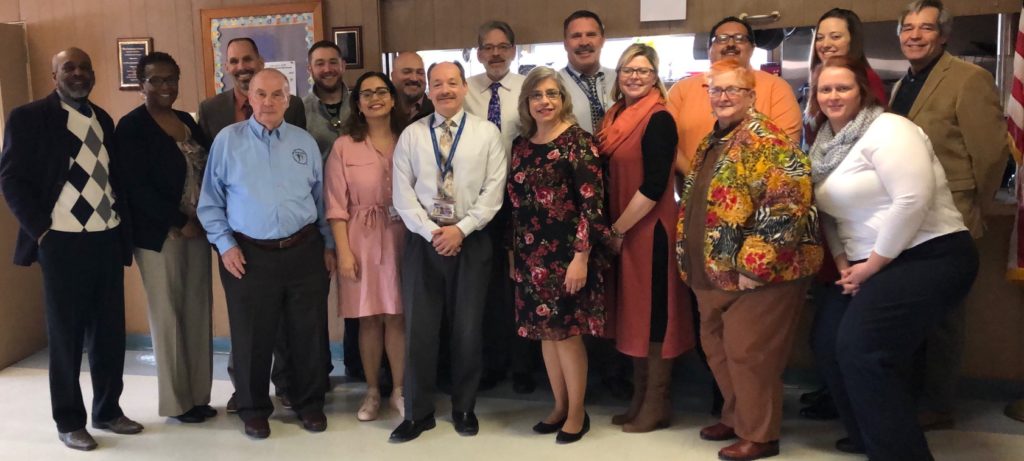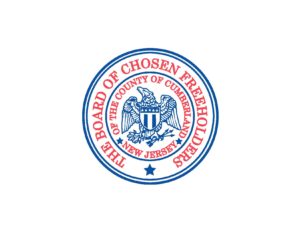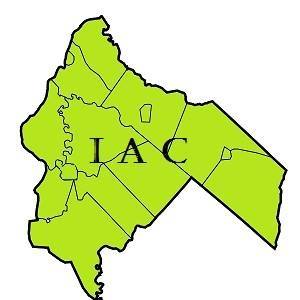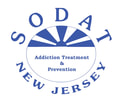SALEM COUNTY
This is Innovation.
About Us

The Salem County Youth Services Commission (SCYSC) is responsible for planning and funding of services for youth involved or at-risk of involvement in the juvenile justice system while serving at an advisory capacity for the county Freeholders. The Salem Inter Agency Council administers the State/Community Partnership Grant and the Family Court Services Funds, for providing various services to at-risk juveniles along the continuum of prevention, diversion, disposition, detention, and re-entry. The Salem Inter Agency Council also prepares a three-year Comprehensive Youth Services Plan, which includes services and sanctions for juveniles adjudicated or charged as delinquent and programs for the prevention of juvenile delinquency. The Youth Services Coordinator assists to develop linkages with communities, schools and key youth serving agencies and organizations and coordinates planning and related activities with other appropriate county bodies, service providers, and local system partners.
The Youth Services Commission meetings are held the first Wednesday of every month and are open public meetings. Members of the public are welcomed and encouraged to attend. The Salem County Youth Services Commission also seeks ongoing familial engagement as an integral component in their scope of work. Please join us in the work of serving our youth and families by attending our meetings listed on the right.
Contact Us
Urie Anderson
Youth Services Administrator
Salem County Youth Services Commission
98 Market Street, 2nd Floor
Salem, NJ 08079
Phone: (856) 935-7510 ext. 8451
Fax: (856) 769-4667
Email: UrieA@SalemCountyIAC.Org
2019 Salem County Youth Services Commission Meeting Schedule
St. John’s Parrish House 76 Market St. Salem, NJ 08079
1). January 2, 2019- 12:30-1:30pm
2). February 6, 2019– 12:30-1:30pm
3). March 6, 2019- 12:30-1:30pm
4). April 3, 2019- 12:30-1:30pm
5). May 1, 2019- 12:30-1:30pm
6). June 5, 2019- 12:30-1:30pm
7). July 3, 2019- 12:30-1:30pm
8). September 4, 2019 – 12:30-1:30pm
9). October 2, 2019 – 12:30-1:30pm
10).November 6, 2019- 12:30-1:30pm
11). December 4, 2019- 12:30-1:30pm
Resources
Please visit our social media and website for more information and current events:
2019 Salem County Youth Services Funded Programs and System Partners
School-Based Delinquency Prevention Programs
The Pittsgrove Township Middle School (PTMS) is committed to creating an environment where all students reach their highest level of academic and social achievement. The main focuses are for students to take ownership and strive to create a safe environment where they demonstrate PTMS P.R.I.D.E. (Patience, Respect, Integrity, Diligence, Empathy), and develop into productive, global citizens. The Pittsgrove Township Middle School continuously seeks to provide programs that are designed to meet the distinct physical, social, emotional, and intellectual needs of its students. To address these needs, the school community strives for excellence with the expectation that each student demonstrates P.R.I.D.E.
The Salem County Youth Services Commission funding is designated for events, clubs, and activities both during and after school, that would focus on P.R.I.D.E., team building skills, encouragement, academic support, while providing and encouraging peer/adult mentorships and athletics. These types of programs support a positive school culture, which would be an added and much needed component. A positive school is recognized as an important target for school reform and improving behavioral, academic, and mental health outcomes for students.
The Pittsgrove Township Middle School (PTMS) is committed to creating an environment where all students reach their highest level of academic and social achievement. PTMS is proud to become and introduce itself as a Renaissance School. By partnering with local businesses, the community, and parents/guardians, this incentive program recognizes students for their hard work and effort in a variety of ways. The Renaissance Program highlights and rewards students in the following areas: academics, behavior, attendance, community service, and after-school participation. A reward/recognition celebration takes place during each marking period once students qualify for the program. In addition, once students become members of the program, they are awarded their Renaissance card, which can be used in the community. A Board-approved advisor meets with students periodically throughout the school year to provide support, and check on student progress within the Program. This advisor oversees both the PTMS Student Council, as well as the Renaissance Program.
Character education teaches children about the underlying principles of how to become successful and productive citizens of our society. To do this, our students must promote the core values that benefit both themselves and our society, that ultimately help to foster ethical, responsible, and caring young people. The PTMS Character Education Program emphasizes the importance of students conducting themselves with P.R.I.D.E. (Patience, Respect, Integrity, Diligence, and Empathy) every day, whether in or out of school. A key component of our program focuses upon conflict resolution. This helps our middle school students to understand the difference between bullying and normal conflict, and how to effectively address both.
 The Quinton Township Culture Club allows seventh and eighth grade students to participate in community- and culture-focused activities and events in an effort to expand student exposure to the world beyond the classroom. These multi-discipline and life-enhancing activities allow students to focus on community-building through volunteering, and cultural diversification via activity variety. Students are introduced to math, cross-curricular, and logic games including Quiddler, Trivial Pursuit, and Chess, and are exposed to multi-discipline STEM and STEAM projects. Students also participate in service projects including baking and delivering cookies. Students round out their in-school cultural exposure with a formal etiquette lesson and dinner, college and career exploration and planning, and rigorous physical activities including tournament-style events. The capstone activities for Culture Club members include educational and cultural field trips to points of interest throughout the bustling Northeast Corridor of the United States. Participation in Culture Club is a fitting send-off to Wildcats wishing to make an immediate impact in their surrounding communities upon graduation from QTS through finely tuned social and cultural skills crafted and honed throughout their time at Quinton Township Middle School.
The Quinton Township Culture Club allows seventh and eighth grade students to participate in community- and culture-focused activities and events in an effort to expand student exposure to the world beyond the classroom. These multi-discipline and life-enhancing activities allow students to focus on community-building through volunteering, and cultural diversification via activity variety. Students are introduced to math, cross-curricular, and logic games including Quiddler, Trivial Pursuit, and Chess, and are exposed to multi-discipline STEM and STEAM projects. Students also participate in service projects including baking and delivering cookies. Students round out their in-school cultural exposure with a formal etiquette lesson and dinner, college and career exploration and planning, and rigorous physical activities including tournament-style events. The capstone activities for Culture Club members include educational and cultural field trips to points of interest throughout the bustling Northeast Corridor of the United States. Participation in Culture Club is a fitting send-off to Wildcats wishing to make an immediate impact in their surrounding communities upon graduation from QTS through finely tuned social and cultural skills crafted and honed throughout their time at Quinton Township Middle School.
The Penns Grove School Based Youth Services Program (PGHS SBYSP) is funded through the State of New Jersey Department of Children and Families (DCP&P) division of Family and Community Partnerships (FCP): School Based Youth Services Program (SBYSP): Office of School Linked Services (OSLS); CFG Residentials, LLC. The School Based Youth Services Program is available to all Penns Grove High School students and their families to develop the attributes and have access to the resources that promote healthy family success across all life domains in a manner that partners with the family in decision making and respects their cultures, values and aspirations.
The PGHS SBYSP model is a complete and comprehensive program developed to promote the health, well-being and personal safety of Penns Grove High School students and their families by working together with parents, caregivers, organizations/agencies and communities to ensure an effective network of proven support services, public education and community advocacy to prevent maltreatment, and provide students and their families with opportunities.PGHS SBYSP addresses the emotional, behavioral, and family problems encountered by children and youth that threaten their safety, well-being, and educational achievement.
The PGHS School Based past provisions were developed as strength based preventative services which consist of, but are not limited to; conducting individual mental health and family services, facilitate several weekly support group services addressing various individual and cultural differences, all of which allow students to access services such as, but not limited to; individual and family mental health counseling services, healthy youth development, employment and college readiness/services, pregnancy prevention programs, access to primary and preventative health services, learning support services, substance abuse counseling/programs, preventive health care, violence prevention/programs, mentorship, teen parent skill development along with recreation in addition to many other core and non-core services that teenagers are faced with that call for several different models of intervention that respond to individual, family and community local needs. The SBYSP schedules special events and field trips to provide participants with structured activities which utilize a variety of trust and self-esteem building exercises, leadership development, peer involvement and additional opportunities for prosocial interaction and development in a monitored setting.
 Students Making Important Life Exchanges was founded in 2015. The club was born out of interest and a need for community service opportunities for Upper Pittsgrove Middle School. The club’s mission is to provide middle school students the exposure to a variety of community service elements.
Students Making Important Life Exchanges was founded in 2015. The club was born out of interest and a need for community service opportunities for Upper Pittsgrove Middle School. The club’s mission is to provide middle school students the exposure to a variety of community service elements.
Weekly, the club members meet to create items for a variety of community service organizations. Some examples, students create gifts for veterans, cards for hospice patients, and lunch bags for food bank programs. Club members also volunteer together outside of school to host birthdays celebrations at a local homeless shelter in the evening hours. Research shows that school-based volunteering programs may help prevent criminal involvement over the course of a juvenile’s life. Smile Club’s goal is to provide a safe, engaging atmosphere to grow the love of volunteering while helping students focus on positive behaviors benefiting the community.


The Arthur P. Schalick MENTORS program was established in 2010. The program allows elementary students to bond with high school students on an academic and personal level. Elementary and Middle School Students in the program receive assistance with anything from academic support, future outlook on life, peer interactions, social situations, and many other aspects mentees are dealing with. All of the high school MENTORS are trained annually by Mrs. Lori Tedesco-Singley a certified prevention specialist and who has been providing training to youth and adults for over 30 years.
Student mentors are identified as being able to mentor younger students and assist them with academic, behavioral and social skills. Mentors are trained in active listening skills, confidentiality, and conflict resolution. Mentors meet with their mentees weekly to establish a rapport. During meetings, mentors focus on a variety of issues as dictated by the needs of the mentee. Mentors serve as positive role models who are making healthy choices regarding academics, substance abuse, and peer relationships. The ultimate goal is to increase the mentees’ abilities to make good choices, maintain good grades, and establish positive relationships with peers and staff. The mentors are referred by school counselors. The mentees are referred by teachers, school counselors, and administrators. Mentees also may be referred by a school’s I&RS team.
Diversion Programs
Diversion is a term used to describe intervention approaches that redirect youths away from formal processing in the juvenile justice system, while still holding them accountable for their actions. Preadjudication diversion programs seek to divert youth who would otherwise have been formally processed in juvenile court.
For over forty years, Youth Advocate Programs, Inc., (YAP) has provided outcomes-driven and cost-effective alternatives to the institutionalization of high risk, high needs young people. Founded in YAP currently operates programs in 23 states and Washington, DC and serves over 11,000 youth, adults and families annually in urban, rural, and suburban settings, including Salem County, NJ. YAP’s clients increasingly are multi-system involved and our programs have expanded to meet these challenges. YAP offers Juvenile Justice programs that alleviate overcrowding in detention facilities, Child Welfare programs that help to heal fractured families,school-based programs that reduce truancy and improve academic engagement, and Behavioral Health programs for young people and adults dealing with intellectual, emotional or developmental disabilities. Though our programs have expanded greatly both in size and scope, YAP has remained true to its mission: to provide “safe, proven effective and economical alternatives to institutional placement. School-based programs that reduce truancy and improve academic engagement, and Behavioral Health programs for young people and adults dealing with intellectual, emotional or developmental disabilities. Though our programs have expanded greatly both in size and scope, YAP has remained true to its mission: to provide “safe, proven effective and economical alternatives to institutional placement.”
YAP’s Pay It Forward Project allows youth, through a community service component, to learn valuable lessons to prevent property offenses as well as serve the community. Property offenses include crimes of theft, larceny, motor vehicle theft burglary, arson, shoplifting and vandalism. The YAP Senior Advocate will identify locations for youth to complete supervised service projects that fulfill the community’s need for restorative justice and build on youth’s interests while the unifying theme of Community Safety and Crime Prevention will structure activities along Balanced and Restorative Justice Principles.
Disposition Programs
Non-Incarceration Options for Juveniles
Juvenile court judges often have broad discretion to fashion a sentence or rehabilitation program that fits the needs of the minor. A disposition order may include options other than confinement, including:
- Verbal warning. The sentence for the juvenile can be as simple as a verbal reprimand.
- Fine. The minor may be required to pay a fine to the government or pay compensation to the victim.
- Counseling. Often, judges require juveniles to attend counseling as part of a disposition order.
- Community service. Juveniles may be ordered to work a certain number of hours in service to the local community.
- Electronic monitoring. Juveniles may be required to wear a wrist or ankle bracelet that verifies their location at all times.
- Probation. Judges often order juveniles to enter probation after a delinquency finding. (To learn more about probation, see the “Probation” section, just below.)
In creating a disposition order, juvenile court judges can order any of the above options alone or in combination. For example, a delinquent minor might need to pay a fine, attend counseling, and perform community service as a penalty for one offense.
 Since 1975, Cumberland County Alcohol & Drug Abuse Services (CCADAS) First Step Clinic, a division of the Cumberland County Human Services Department, has been dedicated to the prevention, early intervention, treatment, rehabilitation and support of persons affected by substance use disorder(s). Our mission is to provide comprehensive alcohol and/or drug disorder and co-occurring services to all men, women and children of Cumberland County and neighboring communities
Since 1975, Cumberland County Alcohol & Drug Abuse Services (CCADAS) First Step Clinic, a division of the Cumberland County Human Services Department, has been dedicated to the prevention, early intervention, treatment, rehabilitation and support of persons affected by substance use disorder(s). Our mission is to provide comprehensive alcohol and/or drug disorder and co-occurring services to all men, women and children of Cumberland County and neighboring communities
Drug and Alcohol Services provided to youth who are referred by Salem County Family Court and Salem County Juvenile Probation include Alcohol and Drug Evaluations, urine drug screens, American Society of Addiction Medicine Criteria (ASAM) Outpatient (Level One) Treatment Services, American Society of Addiction Medicine Criteria (ASAM) Outpatient (Level 2) Treatment Services, Group and Individual Counseling, Family Education, Support and Treatment Services, Transportation, Case Management, Consultation and Review.
The Connect Two Program provides in-home services to Salem County youth who are involved with Family Court and/or Juvenile Probation. Services are provided short-term (generally 10-12 weeks) by professional staff who are accessible twenty-four hours a day, seven days a week via cell phone.
The Connect Two program engages the entire family in order to improve child and family functioning and ensure appropriate structure and limits. When requested by the referral source, the program provides targeted educational advocacy services.
The program utilizes the following strategies and interventions to help youth change their delinquent behaviors and redirect their lives toward a promising future:
- Individual/Family Counseling sessions that are behaviorally oriented and address the underlying family dynamics which precipitated the child’s at-risk behaviors. Sessions provide opportunity for work with the family on limit-setting, parenting skills, self-esteem building, communication skills, behavior modification and anger management. Sessions are held at the youth’s home or at a variety of other convenient sites such as schools, shelters or detention centers.
- Crisis intervention including around-the-clock staff availability via cell phone which is responsive to family concerns and prevents or defuses crises.
- Educational Advocacy with the school system to ensure the child is receiving appropriate and adequate services. This includes empowering families to advocate for an appropriate educational plan for their children and become engaged in their child’s school program.
- Linkages with formal services as well as informal community supports including extended family, neighbors, community activities (Boys and Girls Club, 4H, sports activities, etc.) and other community resources. This includes not only making the referral, but working with the family and the resource to ensure that the connection is made and the services or supports are implemented.
- Aftercare Planning with both family and appropriate agencies in order to prevent service gaps.
The Robins’ Nest Connect Two model has a proven track record of success with this population. Relative to recidivism, the data for January 1, 2017, to September 30, 2017 indicates that 77% or (10/13) youth whom had a 3-month follow-up did not receive new charges.
At a time when there is growing concern about youth engaging in high-risk, and often violent behaviors, the courts and probation are often overwhelmed by their children’s behaviors and search for effective ways to address them. This challenge is mirrored by many families who are also frequently overwhelmed by their children’s behaviors and uncertain of how to address them.
Youth involved in activities that bring them into the juvenile justice system are likely to exhibit either withdrawal, including depression and low self-esteem, or acting-out behaviors including promiscuity, substance abuse, running away, generalized anger and distrust, and aggression. Oftentimes, system partners focus on the acting-out behaviors rather than on the underlying causes of the negative behaviors that bring youth to the attention of the juvenile justice system.
The Connect Two program addresses the identified needs in the County Youth Services Plan. By providing individual and family counseling, crisis intervention, educational advocacy, linkages with formal and informal resources, and aftercare planning, the program has proven to be a powerful resource to divert youth from the juvenile justice system as well as to reduce recidivism. The in-home family-focused, strength-based, and culturally sensitive approach of the Connect Two program supports families to redirect youth involved in high-risk behaviors and to establish realistic goals that support behavior changes and replace anti-social behaviors with pro-social behaviors that result in their becoming productive and contributing members of the community. The target educational advocacy component of the program helps youth experiencing school challenges to secure an academic program where they can learn and achieve success. Collectively, the services offered through the Connect Two program will enable youth to become productive law-abiding citizens.
The Cognitive Life Skills Group program provides two fifteen-week cycles to a total of 24 youth. The program will enroll 12 youth per cycle with the goal of 10 or more youth per cycle completing the intervention. Eleven of the sessions are curriculum-based, two sessions are team building oriented (ropes course), one session will be an off-site community building activity (e.g. museum, community service project, jail facility tour, etc.), and one Graduation session. Food is provided at each session. The groups will be run by two facilitators (at least one certified facilitator) to allow for group content and process to be equally addressed.
The goal of the program is to enhance intrinsic change in the juvenile offender which keeps the adjudicated youth from further recidivism and assists the offender in developing better decision making skills and greater awareness and accountability for their actions. In turn, relevant life-skills group discussions and activities will lead to a youth’s pro-social lifestyle.
During the cognitive behavior program, youth learn essential life skills and alternative coping mechanisms that they can easily incorporate into their lives. Building on a foundation of activity enhanced components, the skills-based curriculum helps young people learn how to avoid negative influences, handle stress and take responsibility for their decisions. The program helps juvenile offenders achieve positive behavior change and gets them moving in the right direction for leading productive lives.
Sex Offender Biopsychosexual Evaluations will serve Salem County youth who are involved with the Salem County Court system and whom have been adjudicated delinquent of a sexual offense by the Juvenile Justice System. Referrals to be made by court order under the juvenile justice continuum of disposition, detention, and re-entry from mandated placement. The use of client-specific funding is determined on a case-by-case and must be approved by the Youth Services Administrator and Juvenile Justice Commission liaison. All Client-specific funds are managed by the Salem Inter Agency Council of Human Services.
Detention and Detention-Alternative Programs
Detention is defined as: In custody (secure, non-secure, or home confinement) while awaiting an adjudication hearing, disposition, or commitment placement.
The GPS Home Detention Ankle Bracelet program is an in-home detention program designed to reduce the number of detention placements, maintain public safety and increase pre-disposition options by providing supervision to youth. Referrals are made through the Salem County Family Court system.
Electronic Monitoring programs help lower public safety for taxpayers by reducing detention populations and lower costs than secure placements. Juvenile offenders continue to have access to community resources such as work, job training or education programming such as work, job training, or education programming. In addition, electronic monitoring provides increased public safety by utilizing the latest ankle monitoring technologies and other supervision strategies.
Incorporated in 1968 as a 501(c)(3) non-profit agency, Robins’ Nest pioneered the group home movement in New Jersey. In 1983, Robins’ Nest again showed vision by developing the first home-based treatment program for troubled children and families in New Jersey. Providing services for vulnerable children and families for 45 years, the agency has developed a broad array of innovative prevention, child welfare, behavioral health, juvenile justice, and supportive housing programs with the shared goal of strengthening families and achieving safety, well-being and permanency for Southern New Jersey’s children and youth. Consistent with our mission to “protect children, strengthen families and empower communities through innovative, life-enhancing services,” Robins’ Nest has a long and well documented history of working collaboratively and successfully with children and youth in the DCF, juvenile justice and mental health systems.
In 2016, Robins’ Nest served over 11,000 children and their families with over 60 programs and services throughout the seven southern counties of the State. We employed 289 staff as of 1/1/2017.
The service component being purchased with this funding request is Grounded. Grounded is an in-home detention alternative program designed to reduce the number of detention placements, maintain the public safety and increase pre-adjudication/pre-disposition options by providing supervision, structure and support to the youth and the youth’s family. The program provides in-home monitoring to Salem County youth who are involved with Family Court. Services are provided for the duration of the Court Order, by the youth monitor who is accessible twenty-four hours a day, seven days a week via cell phone. The following is a description of each service, including purpose and goal of each:
- Face-to-Face (random) in the youth’s home and or youth’s community to ensure compliance with the court order; such a service enables the program to adequately monitor and verify the youth’s whereabouts, develop rapport between the program and the youth/youth’s family, and provide the family with additional support and intervention when issues arise.
- Phone/Collateral (random) provides an alternative method for frequent contact verifying the client’s whereabouts (whether at home or in the community); such a service enables the program to maintain constant contact with the client (including evenings, weekends and holidays) thus increasing the likelihood of Court Order compliance.
- Coordination of Services within the youth’s community (school, employer, or other service providers); such a service enables the program to verify the youth’s activity and decrease the likelihood of lapse in service and/or noncompliance with the Court Order.
- Crisis support with around-the-clock staff availability via a cellular phone number; such a service enables the program to provide any applicable emergent resources which may defuse or prevent active or future crises.
- Linkages are made with community resources; such a service enables the program to provide options for the youth and youth’s family to participate in, in the event that the client/client’s family chooses to increase their formal/informal support network.
- Advocacy for the client (pertaining to education, employment or personal); such a service enables the program to provide a voice for the client thus enabling the likelihood that the client follows-thru with the established goals and/or plan.
As an alternative to incarceration (which is primarily punitive), in-home detention balances discipline with learning opportunities which encourages behavioral changes that will have long-lasting effects and reduce recidivism. In-home detention enables youth to maintain their educational program in their own school setting, maintain employment (if applicable), and remain attending religious events, family gatherings, etc. In addition to being rehabilitative rather than punitive, an ancillary benefit is that in-home detention reduces County Juvenile Detention bed utilization rates. Thus, the program is cost-effective as well as humane.
Admission into the home detention program is by Court Order. The program cannot be accessed in any other way. Eligibility criteria include: youth who reside in Salem County; youth who are willing to cooperate with conditions stated in the Home Detention Contract; youth whose families are willing to cooperate with the provisions in the Court Order; youth who do not present a danger to themselves or to others.
Juvenile Re-entry Services
Juvenile reentry or aftercare- has been defined as the reintegrative services that prepare youths in out-of-home placements for their eventual return home by establishing the necessary collaboration with the community and its resources to ensure the delivery of needed services and
supervision.
General client-specific funds provide funding in accordance with JJC Client Specific Guidelines for statewide goals where the primary goal is to assist youth in obtaining unique services when all other avenues have been exhausted. Referrals made by the Multi-Disciplinary Team for matters such as career training, counseling or other services for those youth under court disposition or re-entering the community from a Juvenile Justice Commission placement. The use of General Client-specific funding is determined on a case-by-case and must be approved by the Youth Services Administrator and Juvenile Justice Commission liaison. All Client-specific funds are managed by the Salem Inter Agency Council of Human Services.
The Salem County B.R.I.D.G.E (Building Relationships Inspiring Dreams and Growing Employment) program is a dual-pronged education program for probation and diverted youth, focused on ages 16-21, in an effort to motivate this target population to pursue either vocational training or post-secondary degree opportunities, when they may not otherwise qualify for or have the necessary support network for such opportunities through the normal course. The Salem County Innovations Subcommittee determined that there are real and tangible advantages to providing non-traditional educational opportunities to juveniles for the purpose of assisting them to either become gainfully employed after high school or to pursue higher education at a post-secondary school and become gainfully employed thereafter.
This new Innovations program aims to address these barriers for youth in Salem County under probation supervision by creating non-traditional educational opportunities through either of two pathways: career exploration and training and/or higher education opportunities, coupled with supportive services (i.e., tutoring, counseling, mentoring, apprenticeships, etc.). Probation statistics revealed that 10% of youth (6 out of 60) on probation are either unemployed or not enrolled in school.
The BRIDGE Programs provides youth on probation/deferred disposition in Salem County the opportunity to participate in career exploration that they would not otherwise have the opportunity to experience through normal high school/vocational school educational pathways.
For youth participants, there are opportunities to participate in trade/occupational certifications; they would not otherwise qualify for in the normal course of high school/vocational school coursework. Included are additional supportive services to ensure maximum opportunity for success, through mentoring, tutoring, counseling, and apprenticeships. The Program Facilitator implements short term certification/trade classes such as OHSA and SafeServ certifications; vocational profiles for employment credentialing in addition to offering supportive mentoring, tutoring and access to community college coursework. The BRIDGE program connects youth to positive adult role models who will provide guidance and assistance in meeting the conditions set forth by Probation. The facilitators, when appropriate, will engage parents and other family members in program activities and share information on the services and resources that exist within the program & community.
The Program Coordinator manages all aspects of the BRIDGE program including, but not limited to: scheduling career exploration sessions, establishing the career/certification modules (i.e. culinary, welding, OHSA, SafeServ), assist youth with registering for college credit courses (where appropriate) and document admission/departure information, order supplies, arrange transportation, and provide program outcomes to the Salem County Council on Juvenile Justice System Improvement.
The Program Instructors to prepare course/certification materials, provide instruction, observe and evaluate student performance, assist students with maintaining course standards and assist with preparation with course certification exam. The program shall include the following components:
- BRIDGE ORIENTATION: This will include an orientation agenda with an accompanying brochure to explain the BRIDGE program, and various pathways to either (a) employment/career exploration or (b) community college. A folder and notebook will be provided to hold these items and other program documents in addition to the youth’s documentation for the BRIDGE program, conditions of probation, program services, evaluations, etc.
- CAREER EXPLORATION/TRADE-CERTIFICATION: This will include an overview of the career path classes and assisting youth with obtaining access to specific classes to develop a skill or obtain certifications that will allow youth to actively participate in the workforce. Youth in the employment/career exploration path will be connected with employers via job fairs and employment referrals.
- COLLEGE-BOUND PATH: The college-bound path will allow youth interested in attending college, the opportunity to work with facilitators/mentors who will provide, guidance, support and assistance with college preparatory course work, placement testing, and college admissions applications. Logistically, the vocational school is available to Salem Community College as it serves as a satellite location. Youth will have to opportunity to take college credit courses at the vocational school, during evening hours, as a probation incentive, in addition to receiving access to advice and support not typically received through traditional high school practices.
SODAT of NJ (Services to Overcome Drug Abuse Among Teenagers, Inc.) has been in operation for 50 years. SODAT was established in 1969 to treat teenagers. SODAT now treats people of all ages for Alcohol, Tobacco and Other Drugs (ATOD). SODAT has offered various prevention programs to individuals and their families throughout Southern New Jersey. SODAT operates under the auspice of the New Jersey Department of Mental Health and Addiction Services, and has been honored to receive the United States Department of Education Award of Excellence and the United States Secretary of State Award for an Outstanding Program.
The goal of the Probation Enrichment and Transportation Program is to provide appropriate support to encourage probationers to successfully complete their court-ordered conditions of probation, and in turn reduce the number of VOPs filed and admissions to detention for VOPs. The program is designed to reward positive behavior by providing healthy/educational activities for youth and families. Components include a probation orientation program, cultural and educational opportunities, transportation to activities, and transportation to appointments, court appearances, probation reporting, and court-ordered evaluations and services.
Step reinforcements or incentives throughout the probation term are provided to youth and families, including items such as meal gift cards and movie theater tickets. Youth may also be provided an opportunity to earn a voucher to participate in community-based, healthy/educational activities after at least 90 days of probation/deferred disposition compliance. The 90 days starts when the youth and his/her Probation Officer have a conversation about earning a healthy/educational incentive. Healthy/educational incentives include opportunities to participate in positive activities through the distribution of vouchers for art classes, CPR Certification classes, Lifeguard Certification classes, Drivers’ License School, or other opportunities selected by the youth.











